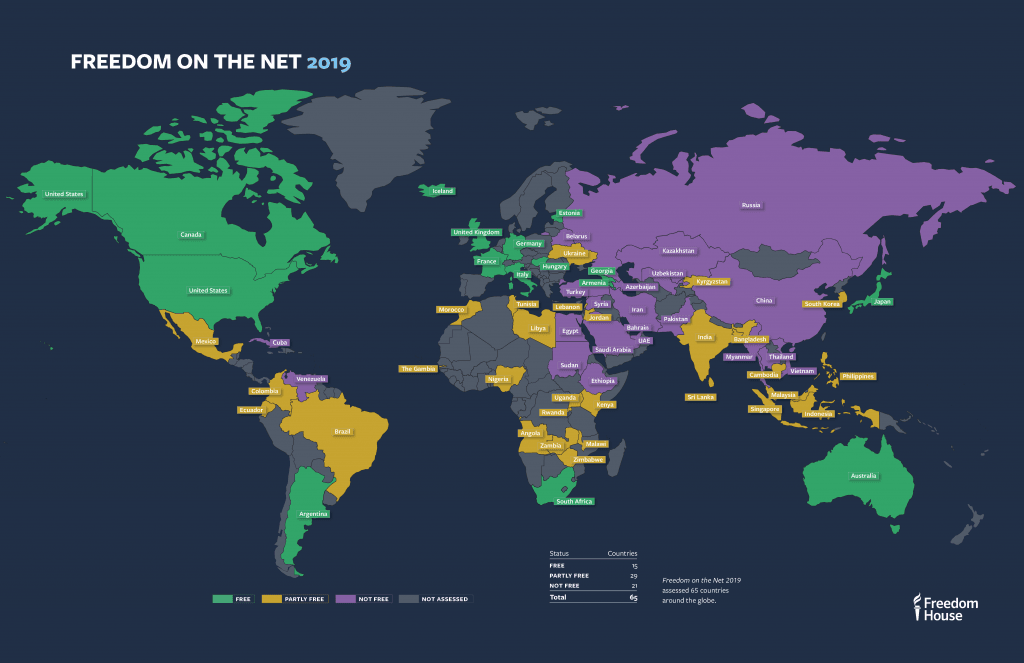Georgia is among the “free” countries with freedom on the net, according to the latest report released by the U.S.-based rights watchdog Freedom House on November 5.
The report, covering the developments between June 1, 2018-May 31, 2019 says authorities in Georgia, “generally respected digital rights,” however, “threats to internet freedom persisted on a number of fronts.” Divided in three major parts, the report describes the situation in the countries in terms of obstacles to access, limits on content, and violations of user rights.
According to the report, “trolling, particularly by government-affiliated bots and users, intensified, most notably around June 2018 protests and the 2018 presidential election.” “Relatedly, harassment continues to mar the internet landscape, with several high-profile cases of online intimidation during the coverage period,” it says.
“Georgia holds regular and competitive elections, and its democratic trajectory showed signs of improvement during the period surrounding a change in government in 2012–13. However, progress has stagnated in recent years. Oligarchic actors hold outsized influence over policy and political choices, and the rule of law continues to be stymied by political interests,” the report also notes.
It further says that whereas the number of internet and mobile phone subscriptions in Georgia continues to grow, “high prices for service, inadequate infrastructure, and slow internet speeds remain obstacles to access.” According to the report, “many restaurants, bars, cinemas, and other public places provide Wi-Fi access, allowing customers to use the internet on their personal devices. However, “despite expanding internet access, many users complain about the poor quality of connections.”
“The government does not place any restrictions on internet connectivity, and the backbone internet infrastructure is owned and operated by private companies,” Freedom House says, adding that “the government did not block access to any communications or social media platforms during the coverage period, and there were no major cases of blocking, filtering, or content removal,” and that “the internet, and social media in particular, continued to be effective tools to share diverse content and for advocacy.”
“However, publishers and hosts operated in an uncertain legal environment during the coverage period that encouraged the exclusion or deletion of legitimate content. That being said, no cases of political, religious, or social content being removed were reported,” the report says, noting that “restrictions on the internet and digital content are generally proportionate, but some legal provisions lack clarity regarding content removal.”
The report also notes that “although self-censorship is not widespread among online journalists and users, some individuals are hesitant to speak candidly online.” “While there is no systematic or pervasive government manipulation of online content, government-affiliated groups have disseminated misinformation on social media to influence public opinion,” it says.
“For instance, during June 2019 anti-government demonstrations, online activists reported that bot accounts and sponsored posts were being used to undermine the protests and disseminate pro-government information,” the report reads. “In recent years, the number of Facebook pages disseminating fake news and far-right ideas has significantly increased, as well as the audience for such content,” it adds.
According to Freedom House, Georgians are “generally free to express themselves online without fear of legal penalties, but a number of prosecutions for online activity raised concerns during the coverage period.” It also says that the authorities “periodically investigate internet users who threaten violence online, and civil society groups say their response can be disproportionate.”
“In February 2019, 16 individuals were arrested under Article 157 of the criminal code for storing and sharing an illegally recorded explicit video featuring Eka Beselia, a Georgian member of Parliament, via social media and messaging apps. As of May, all of the suspects had been released on bail, though they face up to eight years in prison if convicted,” the report notes.
The countries are ranked on a scale of 1 (worst) to 100 (best).
Read also:
This post is also available in: ქართული (Georgian) Русский (Russian)

